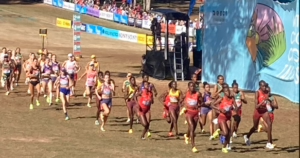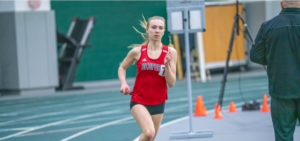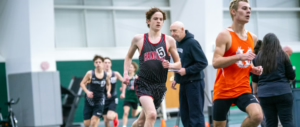Alex McGrath ran cross country at ConVal High School in 2004-2007, eventually winning the Meet of Champions as a senior in a then course record 15:17 at Mine Falls in Nashua. In spring 2008, Alex was New England Champion at 3200. Alex ran for the College of William and Mary where he ran a lifetime personal best of 13:55 for 5000 meters on the track. And, after a stint living abroad in Siberia, Alex became an officer in the US Air Force where he is training as a prospective pilot. A product of a strong ConVal program, including a 2nd place finish at the New England Championships in 2007, Alex joins us now to talk about what he has learned about running, and about life.
course record 15:17 at Mine Falls in Nashua. In spring 2008, Alex was New England Champion at 3200. Alex ran for the College of William and Mary where he ran a lifetime personal best of 13:55 for 5000 meters on the track. And, after a stint living abroad in Siberia, Alex became an officer in the US Air Force where he is training as a prospective pilot. A product of a strong ConVal program, including a 2nd place finish at the New England Championships in 2007, Alex joins us now to talk about what he has learned about running, and about life.
– Scott McGrath
What are you presently doing as a career? Did competing as a runner aid you in pursuing your career?
In September 2016 I became a 2nd Lieutenant in the United States Air Force and I am currently in Undergraduate Pilot Training. In-prospective officers the USAF doesn’t necessitate any particular academic or professional background, but rather recruits individuals who excel in the academic and athletic fields of their choice. It is also important to have leadership experience. The success I had in my running career has opened many doors for me over the years in tangible ways – an athletic scholarship to a prestigious university, bullet points for my Air Force resume, leadership opportunities – as well as intangible ones – developing resiliency, focus, and self-discipline, providing structure to my day, introducing me to good friends and inspiring mentors. More than anything, since I was 14, running has provided me with consistent goals and purpose that have allowed me to focus my energy, increase my productivity, and live a good life.
Describe racing at Derryfield Park. Favorite Memory??
 Derryfield was always my favorite course at which to race and always will be. Even before I raced there myself I enjoyed going to Manchester and watching my older brother and his teams compete against the best in New Hampshire and New England. Once I began competing, I never had a bad day on those hallowed grounds. The course was challenging and has everything you would ever want in a cross country course. It provides enough varied terrain to be exciting for the runner and is compact enough to be exceptionally spectator friendly.
Derryfield was always my favorite course at which to race and always will be. Even before I raced there myself I enjoyed going to Manchester and watching my older brother and his teams compete against the best in New Hampshire and New England. Once I began competing, I never had a bad day on those hallowed grounds. The course was challenging and has everything you would ever want in a cross country course. It provides enough varied terrain to be exciting for the runner and is compact enough to be exceptionally spectator friendly.
I can recall every race I ran at Derryfield and it’s nearly impossible to pick one memory above the rest – placing 3rd in the freshman race in 2004 my first race there, or finally winning Class I’s (Div II) in 2007 in my last race there after coming in 2nd and 3rd the previous two years respectively. Hurdling the steeple barriers, falling in the mud around the dog pound door, the rush of the first climb up the grassy start, even cutting the final hairpin too tight and colliding with that rather large tree with 200 to go (and watching Bishop Guertin’s Anthony Merra sprint away from me for the win (it’s ok – it was still a PR).
Describe both your most memorable and least memorable moments running cross country in high school.
Above all my favorite memories from Derryfield were celebrating a job well done with my teammates. Doing well at Derryfield in  October is what we trained for every year, and time and again we refused to fail, refused to let each other down, and more often than not, we were able to revel in the satisfaction of accomplishing our goals. It didn’t matter if we were exhausted and soaked to the bone in yet another week-long October rain storm. I can still hear the voice of the MC at the awards ceremony, shortly after announcing the finishing place of “Oystahhhhh Rivahhhhh,” announcing the victory had gone to Con-Val, and we got to celebrate over our 15 seconds of fame.
October is what we trained for every year, and time and again we refused to fail, refused to let each other down, and more often than not, we were able to revel in the satisfaction of accomplishing our goals. It didn’t matter if we were exhausted and soaked to the bone in yet another week-long October rain storm. I can still hear the voice of the MC at the awards ceremony, shortly after announcing the finishing place of “Oystahhhhh Rivahhhhh,” announcing the victory had gone to Con-Val, and we got to celebrate over our 15 seconds of fame.
A cruel shock to me was the first time I ventured out of New England and competed at Footlocker Regionals. Throughout high school, I was sheltered in the New England bubble and only ever compared myself to fellow runners in the region. I was oblivious to the national running scene and didn’t realize the vast amount of running talent across the country. I only went to Footlocker Regionals in New York my senior year and it was a complete disaster. I was projected to finish in the top 10 and go to nationals but I blew up and finished around 100th.
What was your favorite high school workout?
We had a number of typical workouts. The workouts emphasized running for a duration of time, rather than a distance, so we did a lot of 60on/60 off hill repeats, or 3:00on/2:00off on the track. The idea to run a time instead of a distance was too focus on the effort, not on the immediate results. Our coach didn’t want us worrying about hitting exact times during workouts. He wanted us to do 3 minutes of high intensity work. It also allowed the whole team to work out together and simultaneously – it didn’t matter if some made it a full 1000 meters or if you only finished one lap, everyone could start and stop together. The rest portion was variable – typically coach wanted our heart rates to be reduced to 120 bpm before starting the next interval. If most of the squad was down to 120 and you were still at 140, you had an idea that you were over working and could adjust accordingly. Also, we did all of our workouts in trainers, not spikes. I didn’t even own spikes until my junior year.
Describe the pressure (if any) you felt competing as one of NH’s top runners in high school.
 I really enjoyed being the team leader and rarely let the pressure affect me in a negative way. More often the pressure I felt had a positive result. I knew my teammates were counting on me and kept me driving through the physical misery of mid-race.
I really enjoyed being the team leader and rarely let the pressure affect me in a negative way. More often the pressure I felt had a positive result. I knew my teammates were counting on me and kept me driving through the physical misery of mid-race.
How did being a top HS runner compare to your experience as a young runner beginning your high school experience?
I had the benefit as a young runner of having an older brother who was a runner. My brother, Scott McGrath, is 3 years older than me and set the school record in the 1600 and 3200. By watching this happen I knew what was possible and I had significant goals to shoot for from the get-go. I saw how much fun he and his friends had running all over New England and I never had any doubt that cross country was exactly what I wanted to do. My father was also an avid runner and helped me develop a love for the sport. He always ran for the joy of it and I rarely thought of running as a chore throughout high school.
I remember my first “long run” with the high school team my freshman year. I was 14 and still growing, and at that time I was a stout 5’8 and under 130 lbs. I could run OK, but I had zero strength. I was able to keep up with some of the varsity sophomores on the team and made it 4 miles out on an 8 mile out and back. Coming back, I started to tire and, eventually, I was the last runner on the trail. My head began to hurt, and my vision started to get blurry. I didn’t know what was happening, and I just struggled to get back. When I finally got back, my head was killing me and I sat down against a tree to rest.
The next thing I knew my brother was carrying me into his car and taking me to the hospital. I had lost consciousness and caused quite a scene. I spent the rest of the day asleep in the hospital connected to an IV. I was either dangerously dehydrated or low on blood sugar, or both. As a young, inexperienced runner, I didn’t know what my limits were until that day.
a scene. I spent the rest of the day asleep in the hospital connected to an IV. I was either dangerously dehydrated or low on blood sugar, or both. As a young, inexperienced runner, I didn’t know what my limits were until that day.
Throughout my high school career I really just focused on getting better. There wasn’t much difference in the day-to-day between freshman year and senior year, except that my goals became more aggressive. I was the top runner on the team by my sophomore year and really just embraced the need to perform every time I laced up my flats or spikes.
Eventually I got a little addicted to winning and didn’t know how to run in a race where I wasn’t likely to win. I never competed as well as I would have liked at New England’s. In 2007 I went out too hard and faded from 2nd to 12th and cost our team 2nd place to a Rhode Island school. It was a crushing result. It was the only race that fall that I hadn’t won and I felt like I had let everyone and myself down. I wasn’t as mentally tough as I thought I was.
Please state where you went to run in college and please describe how this decision was made…how was the experience? How did running in college compare with running at the high school level?
 I ran for the College of William and Mary, a mid-size Division I school in Virginia. Honestly, I only heard about the school after taking a Princeton Review survey and it came up as a match for my academic preferences. Coincidentally, the school in 2007 had one of the best running programs on the east coast and was in the midst of a 14 year NCAA national championship attendance streak. I was sold from the beginning and never really considered going anywhere else. The campus was beautiful, the professors and academic programs were well renowned, the cross country team was spectacular, it was far enough from home to be an adventure, and the weather was warm.
I ran for the College of William and Mary, a mid-size Division I school in Virginia. Honestly, I only heard about the school after taking a Princeton Review survey and it came up as a match for my academic preferences. Coincidentally, the school in 2007 had one of the best running programs on the east coast and was in the midst of a 14 year NCAA national championship attendance streak. I was sold from the beginning and never really considered going anywhere else. The campus was beautiful, the professors and academic programs were well renowned, the cross country team was spectacular, it was far enough from home to be an adventure, and the weather was warm.
Running in college was vastly different than running in high school. The level of competition is much higher, the pressure to perform is much greater, and it takes much more effort to be elite. What works for you in high school probably won’t work for you in college. You need to commit more time, train harder, and recover smarter. It took me over 2 years to deal with injuries and really figure out how much more I needed to do to compete. Eventually, I wound up running 80-100 miles per week and committing 3-5 hours every day to training and staying healthy. I found I had to spend more time in the training room, stretching and doing ancillary activities than my peers to stay healthy. In contrast, in high school I would run 30-60 miles per week and spend no more than 2 hours any given day training.
Finally, being a front runner in high school is poor preparation for highly competitive races in college. Mentally it’s a completely different battle. In high school I thrived on winning. In college you’re not going to win very often. You have to be mentally resilient and adjust quickly to your new reality or else it will destroy you.
What advice can you share with present high school xc runners?
Everyone has to start somewhere. Very few people are universally successful in running. You have to meet and overcome adversity to get better. If you’ve won every race you’ve ever run in your corner of the state, expand your world and find someone who is better than you and you’ll realize how much more you could be doing and how much better you could be.
get better. If you’ve won every race you’ve ever run in your corner of the state, expand your world and find someone who is better than you and you’ll realize how much more you could be doing and how much better you could be.
The hardest thing as a young runner is to keep an open mind about running and understanding that you know next to nothing. If I could go back I would have taken a much more active approach to learning different methods and techniques about training, racing, running form, equipment, nutrition, and recovery. I always thought I knew everything and discarded a lot of good advice. A major reason I was injured my first two years of college was because I was wearing the wrong shoes. I actually had too much arch support in my shoes.
As a young athlete you should start with your coach and learn everything he knows. As a coach, make sure you are making every resource available to your athletes and mentoring them step by step. Don’t just work harder, but work smarter. There are so many ways to increase performance, and running more miles or higher intensity workouts is really just one piece of the puzzle, and I wouldn’t even say it holds a majority share of the whole picture.
My high school coach, Scott Jenkins, did a really good job of keeping us healthy and well-rounded in high school through constant mentorship, a heavy emphasis on core work and running drills, and frequent discussion about form, nutrition, and recovery.












One Response
Alex is a great kid. We “run” into each other every once in a while at the local Thursday night fun run that used to part of his old training routine back in HS. He’s always interested in the local running scene, who’s doing what, and not on his own accomplishments. Always great to talk to him. Great profile.